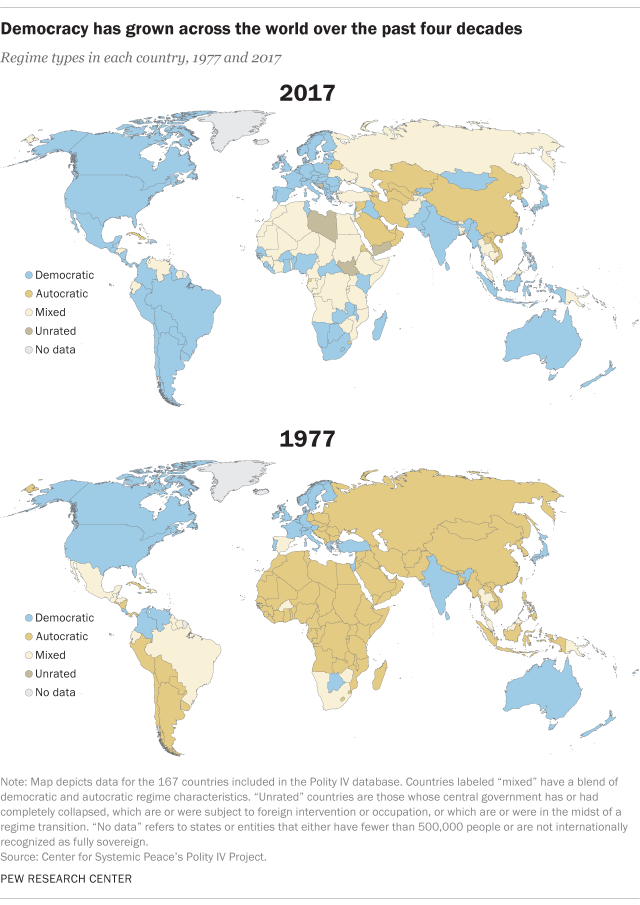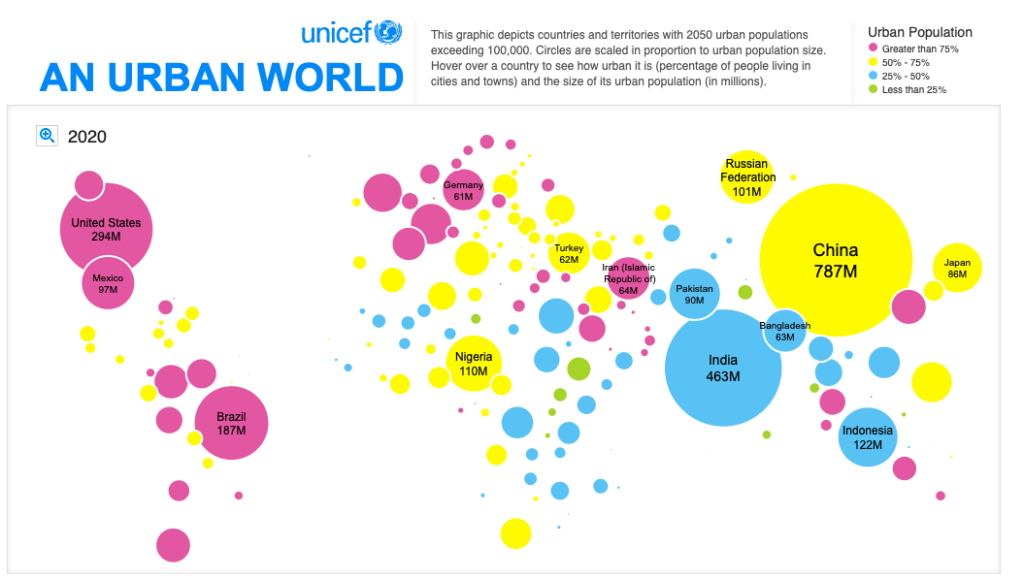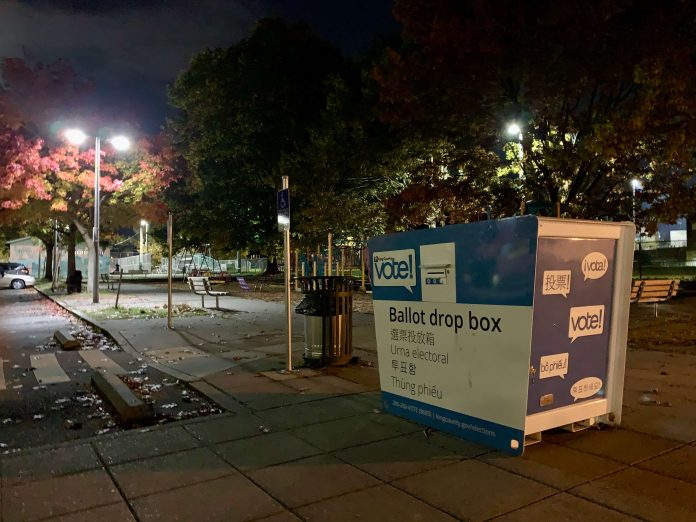The relationship between democracy and cities is a close and longstanding one. It was in the ancient Greek city-state of Athens where the word democracy was first coined from the Greek roots demos (common people) and kratos (strength or power). Today democratic governments can be found on all seven continents and more than half of the world’s countries are democracies, a trend that has been increasing since the 1970s. Similarly, more than half of the world’s residents live in cities, another trend that has been on the rise for over a half century. According to data from the United Nations, since 1950 the amount of people living in cities has surged from 751 million to 4.2 billion in 2018. The UN also projects that by 2050, 68% of the world’s residents will live in urban areas.
Since ancient Greeks gathered in their agoras to discuss the social issues of their day, cities have provided opportunities for social interaction and engagement that allow for democracies to thrive. In cities, people can mingle with people of different walks of life, creating windows into different elements of the human experience that widen understanding and increase empathy toward people facing different challenges and life situations from our own. That’s why the adjective urbane, which comes from the Middle French root urbain–meaning human- can be freely replaced by words like worldly and cosmopolitan. By living in and belonging to cities, we can open ourselves up to belonging to the whole world and extend our sense of responsibility and caring to people who are radically different from ourselves.

But of course we all know that not all people who live in or come from cities conform to the definition of a cosmopolite–first recorded in the mid 19th century to describe someone “free from local, provincial, or national ideas, prejudices, or attachments.” The current US president has been very clear about the prejudices he harbors toward people who do not share his race, gender, wealth, worldview, etc. One of the ugly truths about American society is that not only does prejudice run deep in our country’s history, America was founded on the enslavement of Black people, the genocide of indigenous people, and the suppression of women’s rights to participate freely in society and hold juridiction over their own lives. The fact that so many Americans are disturbed when the president speaks approvingly of white supremacists and brags lewdly about non-consensual sexual conquests shows the progress that has been made painstakingly, and with great sacrifice borne by people of color and other marginalized groups, over generations.
American democracy may have originated with the Declaration of Independence and the Constitution, but it was really shaped into its present form by hundreds of years of vigorous debate and the individual actions of millions of people who have participated in our democracy by voting, volunteering for political campaigns, holding elected office, serving in the military, or petitioning local or federal government. This is not an exhaustive list- there are many, many individual actions that contribute in ways big and small to sustaining our living, breathing democratic society.
Cities are similarly shaped by past and present action. The Seattle we live in today is different than the city that existed ten years or fifty years ago. It is continually being made and remade by the decisions made by elected leaders and other powerful individuals, but also by us, the demos or common people. When we choose to ride our bike to work or submit comments on a design review application or patronize a walkable local business, we participate in the making of our city. Our actions may be small, but they can have remarkable impact. Yet, while it’s true that more than half of the world’s countries are democracies, it’s also true that the definition of what makes a country a democracy is a loose one. The US, for instance, was considered a full democracy back in the 1950’s even though millions of Black voters were disenfranchised from their voting rights. Today the UN reports that while 57% of the world’s countries are democracies, another 28% of countries fall in between democracy and autocracy. Fortunately, the US still ranks as a democracy, but over the last months as we have watched our current president cast grave doubts about the legitimacy of our democratic process, we have seen how easy it could be to slip closer to an autocracy.
Our present situation makes me think of the city of New Orleans in 2005. As a college senior, I had the chance to volunteer on an urban farm in the Lower Garden District for two weeks and it was amazing to see how much history could be found in the soil. Everyday felt like an archaeological expedition. Similarly wandering the streets of New Orleans during my free time was a dizzying experience- the city was vibrant and chaotic, wearing its complex 300-some year history on its sleeve. But New Orleans and its society would change drastically after Hurricane Katrina made landfall a few months later, drowning entire neighborhoods and displacing generations of residents. I’ve returned to New Orleans a few times since and it is clear to me that New Orleans is a different, more sterile place than it was pre-Katrina. A storm that lasted only a few days changed the city forever.
We run the risk of watching a similar disaster unfold over our democracy. Already we have seen how norms have changed and divisions have widened over the last four years under the current president. Four more years of the same could be our democracy’s Hurricane Katrina moment. But here the American people are fortunate. Trumpism is not a natural phenomenon–it is humanmade and by participating in our democratic process we can put an end to it. This participation should not end with voting in the current election. No matter which candidate wins, the road to “normal” may be a long one. But if we continue to engage–to vote, to protest, to petition our leaders, to encourage education, to think critically and share factually accurate information–we can not only keep our democracy alive, we can build a stronger and more just democratic society.
Similarly, now more than ever we need to advocate for our cities as well. According to the UN, the most urbanized continent in the world is not Asia or Europe, but sprawling North America, where roughly 82% of the population is defined as living in an urban area. This statistic is shocking. It shows how- like with democracy- what qualifies as an urban area is very open to interpretation. Even without the threats of climate change pounding on our door, it is clear to many people that the current car-centric model of North American urban development needs to be reset. Our cities can be healthier, more inclusive, more affordable, and more environmentally sustainable.

There’s no hiding the fact that the amount of work in front of us is daunting. But it’s important to remember that the democratic institutions and cities we live in developed over a long time. The path we are on is a long one, and it is certainly is not an easy one and never has been. Still we can all do our part to contribute to the success of our democracy and our cities. Vote. Support local businesses. Walk, bike, or take transit. Volunteer. Participate in public meetings. Reach out to your elected officials about issues you care about. Remember we are the demos and we are strong.
Natalie Bicknell Argerious (she/her) is a reporter and podcast host at The Urbanist. She previously served as managing editor. A passionate urban explorer since childhood, she loves learning how to make cities more inclusive, vibrant, and environmentally resilient. You can often find her wandering around Seattle's Central District and Capitol Hill with her dogs and cat. Email her at natalie [at] theurbanist [dot] org.



